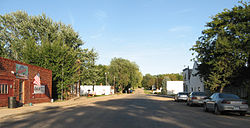Westfield, Iowa
| Westfield, Iowa | |
|---|---|
| City | |

Downtown Westfield, Iowa
|
|
 Location of Westfield, Iowa |
|
| Coordinates: 42°45′21″N 96°36′15″W / 42.75583°N 96.60417°WCoordinates: 42°45′21″N 96°36′15″W / 42.75583°N 96.60417°W | |
| Country |
|
| State |
|
| County | Plymouth |
| Area | |
| • Total | 0.13 sq mi (0.34 km2) |
| • Land | 0.13 sq mi (0.34 km2) |
| • Water | 0 sq mi (0 km2) |
| Elevation | 1,132 ft (345 m) |
| Population (2010) | |
| • Total | 132 |
| • Estimate (2016) | 131 |
| • Density | 1,015/sq mi (392.0/km2) |
| Time zone | Central (CST) (UTC-6) |
| • Summer (DST) | CDT (UTC-5) |
| ZIP code | 51062 |
| Area code(s) | 712 |
| FIPS code | 19-84090 |
| GNIS feature ID | 0462935 |
| Website | City of Westfield |
Westfield is a city in Plymouth County, Iowa, United States. The population was 132 at the 2010 census. It is the westernmost point in Iowa, this being due to a bend in the Big Sioux River. A sign on the highway says "In Iowa, West Is The Best". The nearby Broken Kettle wildlife refuge is one of the few places in Iowa where rattlesnakes are commonly found.
Westfield is the purported home town of the central character, Jack Smurch, in James Thurber's 1931 short story "The Greatest Man in the World." In the story, the fictional Smurch flies a second-hand, single-motored monoplane in July 1937 all the way around the world, without stopping.
Westfield is located at 42°45′21″N 96°36′15″W / 42.75583°N 96.60417°W (42.755884, -96.604050).
According to the United States Census Bureau, the city has a total area of 0.13 square miles (0.34 km2), all of it land.
As of the census of 2010, there were 132 people, 54 households, and 37 families residing in the city. The population density was 1,015.4 inhabitants per square mile (392.0/km2). There were 73 housing units at an average density of 561.5 per square mile (216.8/km2). The racial makeup of the city was 87.1% White, 3.8% Native American, 3.0% from other races, and 6.1% from two or more races. Hispanic or Latino of any race were 5.3% of the population.
...
Wikipedia
